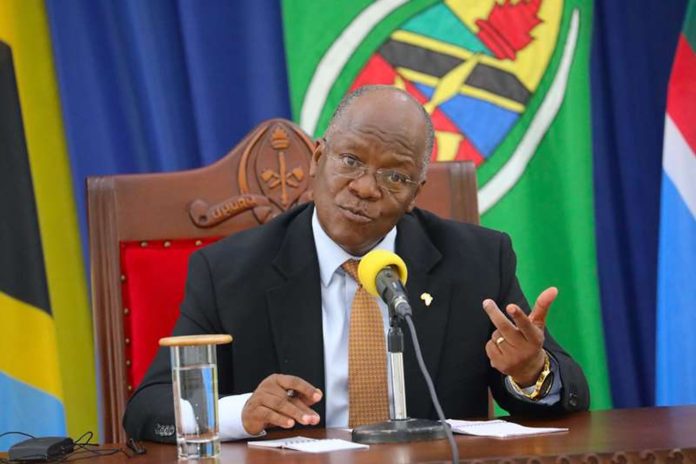MANYARA, TANZANIA — As nations worldwide enforce strict lockdown to quell the spread of the coronavirus pandemic, Tanzania’s President John Magufuli, has advised people to use alternative remedies including steam therapy, he claimed can instantly kill the virus.
In his televised address to the Nation on Wednesday, President Magufuli said water vapor at 100-degree centigrade can obliterate the coronavirus infections entering the body through nasal passage and mouth.
“A virus is simply an oil fat that can dissolve by using soap, methylated alcohol or steam,” he said.
The East African country has seen a rapid increase of coronavirus cases in the past fortnight, a trend experts at World Health Organisation (WHO) partly attributed to the government’s sluggish approach to obey international medical recommendations on social gatherings.
According to official government statistics, the highly contagious disease has so far claimed the lives of 10 people and infected 284 others.
Although the country has suspended international flights, closed schools, and partly deterred social gatherings, places of worship, which attract thousands of congregants remain open and local residents go about their businesses unhindered.
In his remarks, President Magufuli, who was surrounded by heads of the country’s security organs said inhaling steam from boiled water infused with Neem or onions, can kill off viruses.
“I would like to call upon Tanzanians to use steam to combat this disease…water vapor at 100 degrees centigrade can dissolve the virus,” he said.
His remarks, however sharply contrasted with his Deputy Health Minister, Faustine Ndungulile, a medic by profession who publicly stated in April that steaming is dangerous.
Speaking on 13th April, in Dar es Salaam, Ndungulile said steaming is inappropriate and cannot kill the coronavirus.
“Let me tell you, steaming is not the right treatment, it cannot kill the coronavirus,” he was quoted by HabariLeo a state-owned newspaper as saying.
President Magufuli, however, instructed health experts to research on traditional steaming, which he said convincingly could bring relief to patients.
However, speaking on BBC Keith Neal, a specialist in the spread of infectious diseases at the University of Nottingham in the UK warned that inhaling water vapors at boiling point could be extremely dangerous to the patient’s body.
He pointed out hot steam getting into a human body in an attempt to kill the virus, can potentially inflict irreparable damage to the lungs.
Online facts compiled by Reuters Fact Check team, seen by Ubuntu Times suggest the assumption that inhalation of steam in hot water infused with ingredients, will kill the virus is false.
While it may ease symptoms such as congestion, steam inhalation also carries the risks of burn, reads the facts.
President Magufuli, who is a devout catholic, last month encouraged people to go to churches and mosques for prayers because a “satanic” virus can only be cured through prayers.
Amid cheers from the congregants of a chapel in his hometown northwest of Tanzania, the president said the deadly virus cannot survive in the bodies of the faithful when they receive a holy sacrament, prompting thousands of worshipers to throng in churches.
As Tanzania’s largest commercial city of Dar es Salaam, is increasingly becoming the epicenter of the deadly virus, President Magufuli vengefully dismissed the idea of locking it down, on the grounds that it will deter the country revenue since the city serves as a commercial hub for east and southern African countries.
“Some people are suggesting we lock down the city, it will never happen,” he said.
Critics, however, said his remarks hinges on a dangerous moral trade-off between saving lives and sustaining the economy.
“In fact, since I heard that speech, I am really very sad and disturbed,” says Fatma Karume a vocal critic of the President and the former President of Tanganyika Lawyers Association—an umbrella organization for lawyers.
Dar es Salaam, one of Africa’s fastest-growing cities, with a population of 6 million people, serves as a gateway to landlocked countries including Rwanda, Burundi, and Zambia.

